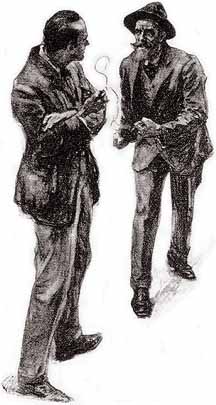“Upon my word, Watson!” said Holmes at last with an unsteady voice, “I owe you both my thanks and an apology. It was an unjustifiable experiment even for one’s self, and doubly so for a friend. I am really very sorry.”
“You know,” I answered with some emotion, for I have never seen so much of Holmes’s heart before, “that it is my greatest joy and privilege to help you.”
He relapsed at once into the half-humorous, half-cynical vein which was his habitual attitude to those about him. “It would be superfluous to drive us mad, my dear Watson,” said he. “A candid observer would certainly declare that we were so already before we embarked upon so wild an experiment. I confess that I never imagined that the effect could be so sudden and so severe.” He dashed into the cottage, and, reappearing with the burning lamp held at full arm’s length, he threw it among a bank of brambles. “We must give the room a little time to clear. I take it, Watson, that you have no longer a shadow of a doubt as to how these tragedies were produced?”
“None whatever.”
“But the cause remains as obscure as before. Come into the arbour here and let us discuss it together. That villainous stuff seems still to linger round my throat. I think we must admit that all the evidence points to this man, Mortimer Tregennis, having been the criminal in the first tragedy, though he was the victim in the second one. We must remember, in the first place, that there is some story of a family quarrel, followed by a reconciliation. How bitter that quarrel may have been, or how hollow the reconciliation we cannot tell. When I think of Mortimer Tregennis, with the foxy face and the small shrewd, beady eyes behind the spectacles, he is not a man whom I should judge to be of a particularly forgiving disposition. Well, in the next place, you will remember that this idea of someone moving in the garden, which took our attention for a moment from the real cause of the tragedy, emanated from him. He had a motive in misleading us. Finally, if he did not throw the substance into the fire at the moment of leaving the room, who did do so? The affair happened immediately after his departure. Had anyone else come in, the family would certainly have risen from the table. Besides, in peaceful Cornwall, visitors did not arrive after ten o’clock at night. We may take it, then, that all the evidence points to Mortimer Tregennis as the culprit.”
“Then his own death was suicide!”
“Well, Watson, it is on the face of it a not impossible supposition. The man who had the guilt upon his soul of having brought such a fate upon his own family might well be driven by remorse to inflict it upon himself. There are, however, some cogent reasons against it. Fortunately, there is one man in England who knows all about it, and I have made arrangements by which we shall hear the facts this afternoon from his own lips. Ah! he is a little before his time. Perhaps you would kindly step this way, Dr. Leon Sterndale. We have been conducing a chemical experiment indoors which has left our little room hardly fit for the reception of so distinguished a visitor.”
I had heard the click of the garden gate, and now the majestic figure of the great African explorer appeared upon the path. He turned in some surprise towards the rustic arbour in which we sat.
“You sent for me, Mr. Holmes. I had your note about an hour ago, and I have come, though I really do not know why I should obey your summons.”
“Perhaps we can clear the point up before we separate,” said Holmes. “Meanwhile, I am much obliged to you for your courteous acquiescence. You will excuse this informal reception in the open air, but my friend Watson and I have nearly furnished an additional chapter to what the papers call the Cornish Horror, and we prefer a clear atmosphere for the present. Perhaps, since the matters which we have to discuss will affect you personally in a very intimate fashion, it is as well that we should talk where there can be no eavesdropping.”
The explorer took his cigar from his lips and gazed sternly at my companion.
“I am at a loss to know, sir,” he said, “what you can have to speak about which affects me personally in a very intimate fashion.”
“The killing of Mortimer Tregennis,” said Holmes.
For a moment I wished that I were armed. Sterndale’s fierce face turned to a dusky red, his eyes glared, and the knotted, passionate veins started out in his forehead, while he sprang forward with clenched hands towards my companion. Then he stopped, and with a violent effort he resumed a cold, rigid calmness, which was, perhaps, more suggestive of danger than his hot-headed outburst.

“I have lived so long among savages and beyond the law,” said he, “that I have got into the way of being a law to myself. You would do well, Mr. Holmes, not to forget it, for I have no desire to do you an injury.”
“Nor have I any desire to do you an injury, Dr. Sterndale. Surely the clearest proof of it is that, knowing what I know, I have sent for you and not for the police.”
Sterndale sat down with a gasp, overawed for, perhaps, the first time in his adventurous life. There was a calm assurance of power in Holmes’s manner which could not be withstood. Our visitor stammered for a moment, his great hands opening and shutting in his agitation.
“What do you mean?” he asked at last. “If this is bluff upon your part, Mr. Holmes, you have chosen a bad man for your experiment. Let us have no more beating about the bush. What DO you mean?”





